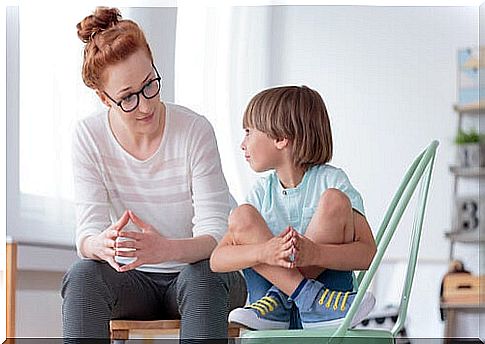How To Educate Your Children Through Dialogue

The family is the social institution par excellence in which we learn to be people. Therefore, good communication is a very valuable tool that we can use as parents to ensure that our children can and know how to function adequately in all areas of life. The question is, therefore, how you can educate your children through dialogue.
To answer it, it is important to reflect on what characteristics and what communication is like in our family. What is it more like, a dead end or a highway? Is dialogue allowed or are concessions given for nothing?
If we take advantage of that great opportunity that life gives us to positively influence the formation of our children, promoting transparent and fluid communication within the family, we will obtain a win-win situation. And this will redound to the benefit of all, in that of our children, first of all, but also in our own.
What kind of father are you?

Parents often believe that they communicate well with their children. But if communication consists of advising, criticizing, giving orders, scolding, questioning, lecturing, without moments dedicated to listening … Then, it is not a dialogue, but basically a monologue.
As it happened to us when we were little, our children also “enter through one ear and exit through the other”. Because one-way phrases are not synonymous with educating your children through dialogue, but are more like showing neither respect nor understanding for their concerns, problems and feelings.
This, in the end, deteriorates family relationships, as well as the self-esteem and self-confidence of the children. In this sense, there are certain roles that parents assume with good intentions, but that in reality prevent a healthy and authentic relationship with their children.
Some of these roles are:
- The authoritarian general: gives orders and threatens to maintain discipline through terror.
- The moralist: lectures and advises all the time.
- The know-it-all: lets your child know that you are superior to him and that he is always right because of his greater experience, knowledge and age.
- Acid – Use criticism, taunting, and disqualification.
- The Comforter: Avoid getting involved by pretending that everything is fine, thus ignoring problems.
Tips to communicate better
One aspect of communication that seems too obvious, but is sometimes forgotten when it comes to parent-child communication, is that it has two senses: speaking and listening. It is bidirectional and is a symptom of educating your children through dialogue.
Listening to children with respect is a vital practice that gives them the necessary space to express their ideas and emotions in a climate of acceptance, even if you do not always agree with what they say. This, by itself, means a breakthrough in family relationships and can help educate.

Some ideas to listen effectively to children and thereby encourage their social and personal adaptation are:
- Reflecting feelings: this involves being sensitive to what our children are feeling, and then expressing to them that we understand them, without making judgments and, of course, without ignoring them. For example, if our daughter tells us: “I’m sick of my teacher, she always blames me for everything!” Instead of lecturing her and blocking communication, we can reflect her feelings as if we were a mirror, saying, “I see that you are upset with your teacher because she is unfair to you.” By doing this, we show her that we care, that we do not reject her emotions, and we invite her to reflect with serenity, as we have given her a healthy space to vent.
- Exploring alternatives: when children present us with a problem or situation that disturbs them, instead of giving them immediate advice, we can encourage them to find the solution themselves, asking open questions. For example, what do you think you can do about it? What do you think is the best solution and why? In this way, we help them to be independent, we stimulate dialogue, reflection and we show them interest in their affairs.
Educating your children through dialogue is not losing authority
It is enough to shed somewhat of the role of superiority that parents usually assume. And make small changes in the way we communicate with our children. Many parents fear losing authority or respect for their children if they are too close and vulnerable.
However, if we “get off the pedestal” and get closer to them, the quality of communication and family relationships will improve. He will do it in a meaningful way, earning us respect with our example, rather than out of fear.









